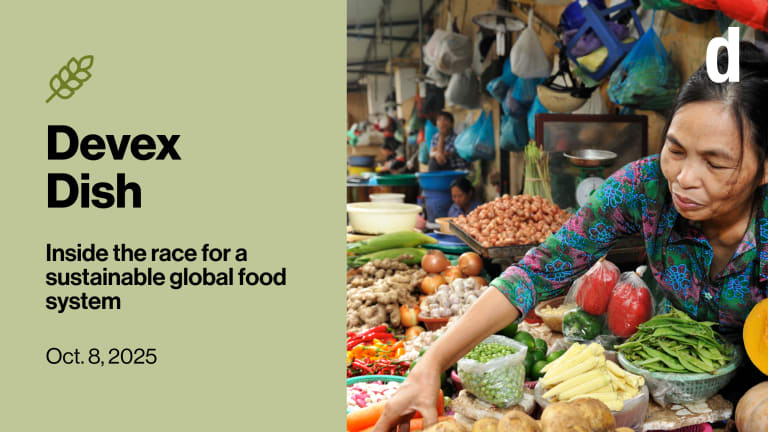Shared value: Taking 'doing good' from the periphery to the center
The new Energize Learning project in Ghana shows us how one global confectionery company is working with the national government and nonprofit sector to invest in the future of one of its largest developing country suppliers.
The private sector has long been seen as an engine for economic growth, but it has in recent years also increasingly been recognized as a crucial player and partner in international development. While the manner of business’ involvement is still under contention, some companies are beginning to join the shared value movement by transforming traditional corporate social responsibility activities to better respond to their possible new job description. Heightened interest and optimism about business’ place in development have been triggered in large part by austerity measures that have forced many traditional donors and donor countries to tighten their belts on development aid. Unsurprisingly, mobilizing domestic resources and leveraging private finance for development objectives were among the hottest topics at the recently concluded third International Conference on Financing for Development in Addis Ababa, Ethiopia. By generating jobs and contributing taxes to the government, business plays an important part in a country’s economic development. However, the global development community — particularly civil society — remains less sure about just how far the sector can go in working to eradicate extreme poverty and promote human rights globally. ‘Excited but skeptical’ While business revenues keep economies afloat, the reality is that tax evasion and illicit financial flows keep the money from trickling down and improving conditions for the world’s poorest. “The major reason [for skepticism] is that the private sector is for-profit and does not put social factors as the primary objective of their operations,” Tarcicious Mufundisi, a trade and private finance policy officer at the African Forum and Network on Debt and Development, told Devex. “At the same time social impacts of private sector operations are difficult to measure.” Because of the fundamental difference between the goals and mandates of the public and private sectors, private finance should not be touted as a funding panacea or substitute for support from the public sector. Limited scrutiny of the operations and records of businesses also means that there may be less transparency and accountability in the private sector’s handling of funds for development. Winnie Byanyima, Oxfam International’s executive director, said in a previous Devex interview that it was “excited but also skeptical” about the growing involvement of the private sector in development. “The private sector, the companies, really are primarily accountable to their shareholders, and their accountability to citizens at large have generally been weak,” she said. “We have a whole legacy of firms trampling on the human rights of poor people, especially damaging the environment.” Traditional corporate social responsibility models have also received criticism, with some believing that their contributions to real sustainable development are overblown. According to Mufundisi, CSR may be used by large corporations for mere reputation management, or worse — to dodge accountability and avoid blame for pollution or environmental degradation. “For it to make a lasting and sustainable impact in the communities, it should be a win-win scenario and should be inclusive [and] not for corporations to dictate and do what they want without input and active contribution of the communities,” Mufundisi said. Shared value vs. CSR While CSR is typically at the periphery of how businesses operate, shared value offers a more fundamentally integrated way of doing business and pursuing social and environmental impact. Where CSR might be detached from a business model, shared value is at its core. Coined by Harvard Business School professor Michael Porter and philanthropy and CSR expert Mark Kramer, shared value includes “corporate policies and practices that enhance the competitiveness of a company while simultaneously advancing social and economic conditions in the communities in which the company sells and operates.” “The shared value idea is opening up business thinking to participating in development but not out of sort of being good citizens but out of the fact that there is truly shared value for them,” said Porter in a previous interview with Devex. Some believe that this new social initiative approach — which downplays neither the private sector’s profit purpose nor the complexity of sustainable development — could be a game changer, and just what businesses need if they are to become genuine partners for social change. Investing in the supply chain, a future market “When you have a shared value between a company and a social need, the company can make an intervention and help solve social problems, along with meeting its own aims of selling products and making funds,” Jeff King, a senior director at the Hershey Co., told Devex. The company, which sources two-thirds of its cocoa from West Africa, has recently launched Energize Learning — a project aimed at reducing childhood malnutrition among Ghanaian school children, many of whom experience a diminished ability to learn. The initiative is a joint effort between Hershey, the Ghanaian Ministry of Education and Project Peanut Butter, a nongovernmental organization that produces ready-to-use therapeutic food for the treatment of severe acute childhood malnutrition. The project was born after Hershey’s CEO John Bilbrey met with Ghanaian President John Dramani Mahama to talk about the state of cocoa. Before parting, however, the president mentioned that they would appreciate any help the confectionery company could extend to their national school feeding program. “And that’s when we started to mobilize,” King said. This need, paired with Hershey’s expertise in nutrition and food science, made the project the perfect social initiative for the company. “As a company, we are starting to consolidate a lot of our efforts around childhood nutrition,” King said. “Childhood nutrition is where we really believe we can make the biggest impact.” Energize Learning aims to supplement nutrition of children in the Ghana School Feeding Program by distributing and feeding them Vivi, a fortified peanut paste manufactured in the Hershey-funded Project Peanut Butter factory. “One major aspect of sustainability in this initiative is the use of local ingredients, staff and distributors,” Carly Edwards, Ghana country director of Project Peanut Butter, told Devex. “Ensuring that we are able to use local peanuts is huge for the sustainability and reach of this project. We will do this by working together with Ghanaian farmers, aggregators and roasters to ensure that our end input is low aflatoxin, clean peanuts.” Like Hershey’s CocoaLink program, another social initiative that uses low-cost mobile technology to deliver practical agricultural and social information to rural cocoa farmers in West Africa, Energize Learning will also provide agricultural support to the peanut suppliers of Vivi. Packaging of the supplement will also double as educational material teaching children and their parents about nutrition and proper eating habits. Hershey is also working with the University of Ghana to do an impact analysis of the project over the next two years. The evaluation will hopefully show Vivi’s positive effect on children’s nutrition, growth and ability to learn. “We’re doing this with childhood nutrition in West Africa [because] we’re in West Africa,” King said. “Again, we get cocoa from there. So we’re helping invest in the public for that country.” He added that Hershey sees West Africa as a future market, possibly for healthy snacks instead of candy. For now, however, they are focused on thinking of how to scale up the program — and reach 2 million students from the current 50,000. “When I think about establishing a shared value … you’re able to really solve social problems while meeting the aims of business, which then enables you to help solve more social problems,” King said. Check out more insights and analysis for global development leaders like you, and sign up as an Executive Member to receive the information you need for your organization to thrive.
The private sector has long been seen as an engine for economic growth, but it has in recent years also increasingly been recognized as a crucial player and partner in international development. While the manner of business’ involvement is still under contention, some companies are beginning to join the shared value movement by transforming traditional corporate social responsibility activities to better respond to their possible new job description.
Heightened interest and optimism about business’ place in development have been triggered in large part by austerity measures that have forced many traditional donors and donor countries to tighten their belts on development aid. Unsurprisingly, mobilizing domestic resources and leveraging private finance for development objectives were among the hottest topics at the recently concluded third International Conference on Financing for Development in Addis Ababa, Ethiopia.
By generating jobs and contributing taxes to the government, business plays an important part in a country’s economic development. However, the global development community — particularly civil society — remains less sure about just how far the sector can go in working to eradicate extreme poverty and promote human rights globally.
This story is forDevex Promembers
Unlock this story now with a 15-day free trial of Devex Pro.
With a Devex Pro subscription you'll get access to deeper analysis and exclusive insights from our reporters and analysts.
Start my free trialRequest a group subscription Printing articles to share with others is a breach of our terms and conditions and copyright policy. Please use the sharing options on the left side of the article. Devex Pro members may share up to 10 articles per month using the Pro share tool ( ).
Liana is a former Manila-based reporter at Devex focusing on education, development finance, and public-private partnerships.








